PARADE
I had seen this musical sixteen years ago at the Mark Taper Forum, and while I totally recognize the merits of it, (then and now,) the true story is just way too sad for me. But I had heard so many good things about this Michael Arden-directed revival, (which turned-out to be correct,) that I felt I should give Parade another chance. And I’m glad that I did.
I brought my musical theatre expert, Nina Herzog, with me. She’s a very-working musical performer herself, (and has worked with this composer, which means she has personal insights,) so I asked her to share her thoughts on the show. She’s fair and knowledgeable, so I trust her to give you the true lowdown. And her writing is beautiful, so it will be a treat for you.
But before I turn this review over to her, I have to proffer just a few of my own impressions of this National Tour production of Parade, this time at the Ahmanson, with very different staging from the former one at the Taper. Nina and I both felt that this one is far superior. It’s an overall excellent, high quality production in every way; I just hate the true story.
I knew the horrible real-life tale going in, (which Nina will break down for you in a minute,) so I was braced for the depression. It made me realize that I love musical comedy, not musical tragedy. So I stick by my original long-ago assessment of the narrative, which is that I cannot understand why anyone would make a musical out of this heartbreaking incident!
But this time, I joined the very appreciative Opening Night audience in whooping and hollering all night.
Actually, there is a lot I appreciated about this production. First of all, most of the show is performed on a very high platform in the center of the stage, which means that no one’s head can block your view. And my research-minded self loved seeing the photos of the real people who lived this horror, along with wonderful projections of items such as newspapers featuring headlines of the day, and location markers, (like my all-time favorite structure, the iconic Brooklyn Bridge.) And it’s very helpful that they superimpose the dates and setting info right on the front of that platform. The whole production is well done; you can tell that tons of thought and work went into this entire presentation.
It’s all exciting and lovely for a while, and then after about twenty minutes, when the main plot kicks in, I can’t bear the unfairness that happened to this couple.
But the music is powerful, and the talented cast of twenty-three or so are all excellent singers. The two stars, Max Chernin and Talia Suskauer, play their parts of Leo and Lucille wonderfully. My fave voice belongs to Ramone Nelson, who plays manipulated janitor, and later chain gang member, Jim Conley. I also admired the singing voices of Jack Roden, (as the deceased girl’s young pal,) and Trevor James, (as a generic “every guy” at the very beginning,) in their smaller roles. And if you’re casting an entertainment about J.D. Vance, look no further than his doppelgänger, Griffin Binnicker, who plays Tom Watson here.
I have two favorite lines from Parade, both of which resonate today. First up is Leo telling his Atlanta-born wife, “I don’t understand how God created people to be Jewish and southern at the same time.” And later, the Governor’s wife declares, “I’d rather be a wife to a former governor than be First Lady to a chicken!” (Coincidentally, Nina chose the same lines to discuss, without us even mentioning them to each other!)
Because I want to end this review on Nina’s beautiful writing, I have to tell you about two auxiliary opportunities now. One is that, for every show at the Ahmanson, you can enjoy the most incredible tacos right out on the side plaza of that theatre! OMG, are they delicious! And affordable, which is a bonus in today’s crazy world.
The other is that, through July 12th, if you arrive early, you can do a totally free guided audio “walking tour” of the outdoor spaces surrounding the Mark Taper Forum and the Ahmanson Theatre. For more details about that experience, go to www.centertheatregroup.org/artistic-programs/walk-with-me-ctg-an-interactive-audio-experience.
Now here’s my friend Nina Herzog’s absolutely lovely and complete assessment of Parade:
It’s a show that doesn’t simply revisit a dark chapter of American history, it dissects it, grieves it, and ultimately demands that we learn from it.
At its center is Leo Frank, a shy, bookish Jewish man, whose quiet nature places him starkly at odds with the loud, fervently-biased culture surrounding him in 1913 Georgia. In today’s world, “quiet”, intellectual, introverted people still struggle to be seen, understood, and believed in our culture—Parade taps into that uncomfortable truth with haunting resonance.
His wife, Lucille, begins the show as a “mousy” woman—soft-spoken and emotionally reserved, still not entirely settled in her marriage. But when Leo is wrongly accused of murder, we witness an extraordinary transformation—which Talia Suskauer executes brilliantly. The trial becomes the crucible through which she emerges: strong, impassioned, courageous. She finds her voice—and in doing so, wins not only the audience’s love, but Leo’s. You sense that he, too, only begins to truly see her once the noise of the world closes in. The expansion happens musically, too, and Talia’s range expands into a near roar, (albeit a gorgeous one,) by the second act.
One of the most painful moments of the night came when the word “Jew” was hurled onstage. A visible (and audible) shudder ran through the theater. It wasn’t just a line; it was a wound being reopened, in real time. In the crowd, a Jewish woman gasped, “Oy,” aloud when one of the final lines—“He doesn’t need pants where he’s going”—made clear that Leo was being taken to be lynched. That involuntary cry wasn’t just emotion—it was recognition. Fear. Ancestral grief.
The show doesn’t shy away from the brutal antisemitism Leo faces. He’s the intellectual, an outsider, with a wife who has dark features among a sea of blond Southern accusers. One of Karen’s aforementioned favorite lines, “For the life of me, I can’t understand how God could create people who are Jewish and Southern at the same time,” lands sharply, with a deep cultural sting. It speaks to the absurdity—and pain—of being doubly “othered.” The show’s humor never undercuts its gravity; it deepens the resonance.
As to the songs, what soaring music this is. The vocal range required is immense, the melodies operatic in scale and nuance. The actors don’t just sing—they weep, “bleed”, and soar. Leo and Lucille’s duet late in the show, when they finally let their guard down and see one another clearly, is a triumph of vulnerability. It is raw, romantic, and devastating; my eyes welled with tears.
Lucille’s arc is a study in spiritual resilience. In one early scene, she cautions Leo not to be “too Jewish”—a heartbreaking nod to the way Jewish people have long been forced to measure their safety of visibility or navigate how much to assimilate for survival. That fear, sadly, still resonates today as antisemitism rises once again. But by the end, Lucille reclaims her strength and her identity. She stays in Georgia after Leo’s lynching—not as a victim, but as a resister. She holds her ground. As the direction subtly suggests, she rebuilds a life, even re-hiring the black housekeeper who once worked for them—together, a different kind of family.
And then there’s the line that Karen mentioned in her take of the show, uttered by the Governor’s wife, which brought the house down. Karen wrote it literally, but it translates to basically, “I’d rather be married to a man who doesn’t get elected than to a man who doesn’t have enough courage to do the right thing.” In today’s political climate, the line doesn’t just land—it detonates. The opening night crowd roared. It’s a reminder that integrity and justice must always outweigh blind allegiance to power.
As someone who has had the extraordinary privilege of learning from, knowing, and working with the composer and lyricist of Parade, Jason Robert Brown, I can say this: he writes songs like monologues. When I once sang for his composer workshop, he asked me to deliver a song not as a vocalist, but as an actor in a monologue —and the experience changed me. The way he writes—melodies shaped by emotion, lyrics that drive story—is nothing short of theatrical genius. I later had the chance to work with him again, recording demos for his The Bridges of Madison County at Capitol Records. That show, like Parade, gave voice to a quiet woman’s awakening, capturing inner transformation through music. It’s a through-line in Jason’s work: he lifts the overlooked to center stage, the quiet voice finds its boldness.
The show closes with Leo reciting the Shema Yisrael prayer—his final declaration of faith and identity. It is gutting and holy. He also says, “God has a reason for this.” It’s a hard line to hear when faced with such cruelty.
With gorgeous, painterly direction and an unforgettable score, Parade is not just a musical—it’s a reckoning. And it leaves no heart untouched.
I, Karen, can add only—what she said.
Parade running through July 12, 2025
Ahmanson Theatre 135 N. Grand Avenue
213-972-4400 www.centertheatregroup.org

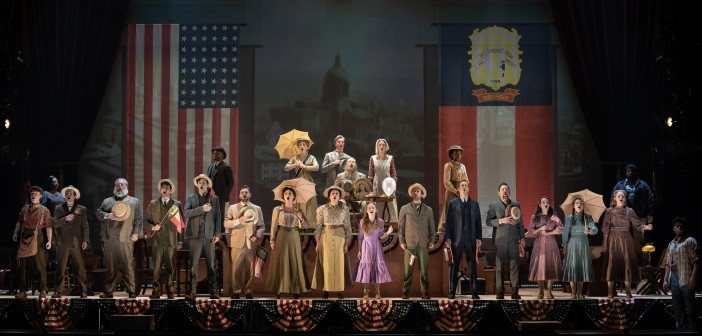


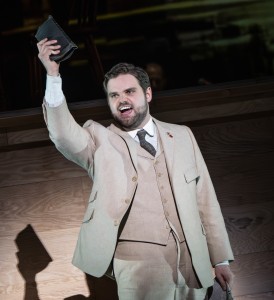

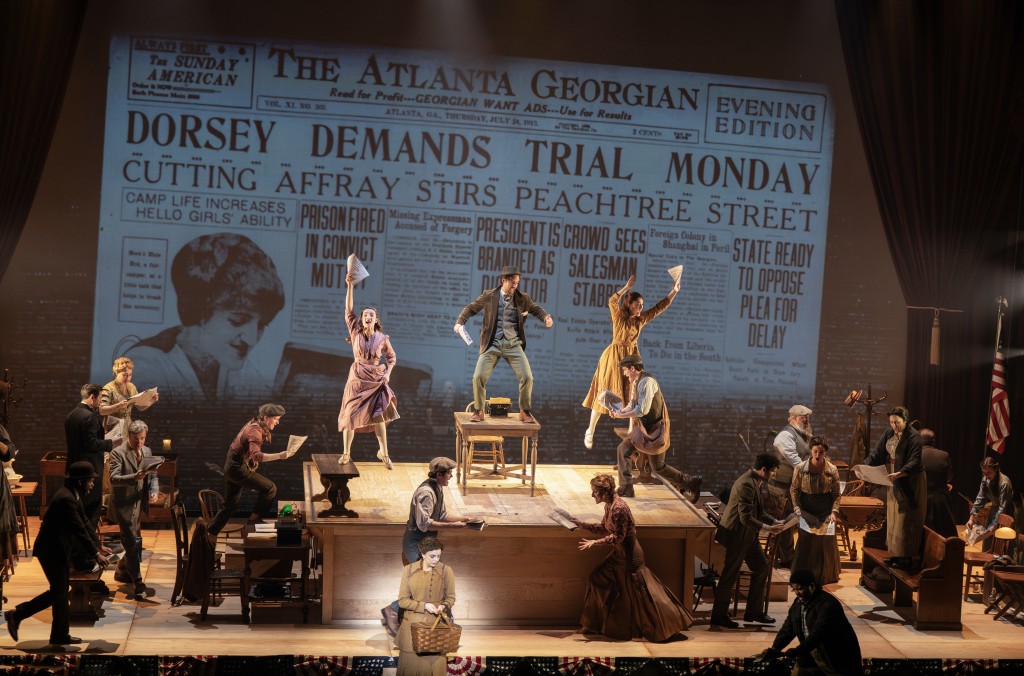
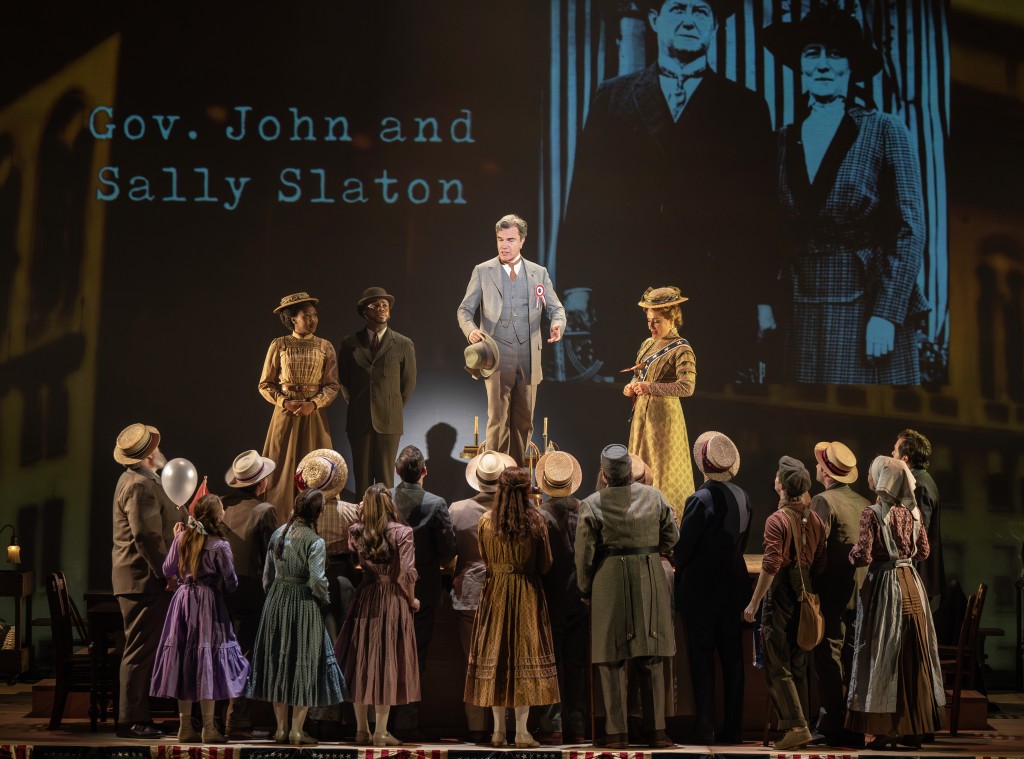
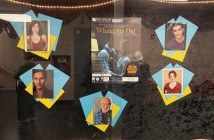
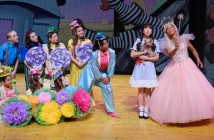

1 Comment
My friend and I saw Parade last night and thought the same thing about that guy looking like JD Vance!